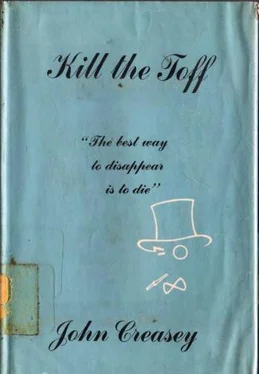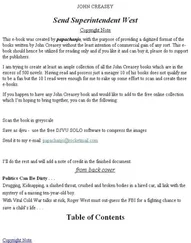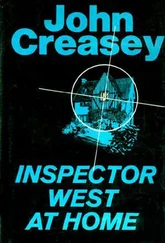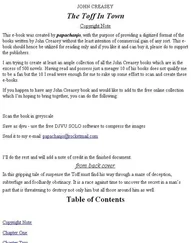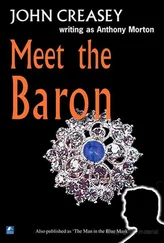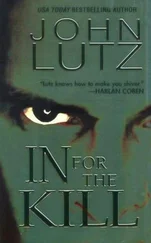John Creasey - Kill The Toff
Здесь есть возможность читать онлайн «John Creasey - Kill The Toff» весь текст электронной книги совершенно бесплатно (целиком полную версию без сокращений). В некоторых случаях можно слушать аудио, скачать через торрент в формате fb2 и присутствует краткое содержание. Жанр: Старинная литература, на русском языке. Описание произведения, (предисловие) а так же отзывы посетителей доступны на портале библиотеки ЛибКат.
- Название:Kill The Toff
- Автор:
- Жанр:
- Год:неизвестен
- ISBN:нет данных
- Рейтинг книги:5 / 5. Голосов: 1
-
Избранное:Добавить в избранное
- Отзывы:
-
Ваша оценка:
- 100
- 1
- 2
- 3
- 4
- 5
Kill The Toff: краткое содержание, описание и аннотация
Предлагаем к чтению аннотацию, описание, краткое содержание или предисловие (зависит от того, что написал сам автор книги «Kill The Toff»). Если вы не нашли необходимую информацию о книге — напишите в комментариях, мы постараемся отыскать её.
Kill The Toff — читать онлайн бесплатно полную книгу (весь текст) целиком
Ниже представлен текст книги, разбитый по страницам. Система сохранения места последней прочитанной страницы, позволяет с удобством читать онлайн бесплатно книгу «Kill The Toff», без необходимости каждый раз заново искать на чём Вы остановились. Поставьте закладку, и сможете в любой момент перейти на страницу, на которой закончили чтение.
Интервал:
Закладка:
“I’ll see to it,” promised Jolly.
“Thanks.”
“I hope the situation isn’t really grave,” said Jolly earnestly, it has already become a very different affair from what we first anticipated. I suppose—” Jolly paused, as if diffident, but actually to give greater emphasis to what he had to say and Rollison eyed him expectantly. “I suppose there is no doubt at all, sir, that James Mellor is Sir Frederick Arden’s son? Because if you are wrong in that assumption then it would greatly alter the complexion of the case, wouldn’t it?”
“No.”
“I beg your pardon,” said Jolly, startled.
“The complexion of the case is the same— Judith Lome having a rough time, funny business in one of the East End gangs and a warning-off both by Grice and Bill Ebbutt. If you mean it’s no longer a gentle inquiry to soothe Sir Frederick Arden’s feelings, you’re right; but that changed when we knew Mellor was wanted for Galloway’s murder, didn’t it?”
“I suppose it did,” conceded Jolly. “May I say I hope you won’t take too many chances, sir.”
“We’ll have a chat about it later,” said Rollison. “I want to hide Mellor. Ebbutt won’t help and he can’t come here. Any idea?”
Jolly said: “That makes it very difficult.”
“Meaning, no ideas,” Rollison smiled. “All right, Jolly, I think I know where we can park him. There are a few don’ts for the list. Don’t let the police know that I’m doing anything for Sir Frederick Arden. Tell Miss Lome not to mention the name Arden to them. They won’t necessarily tie it up with Sir Frederick. Don’t say anything to the Press if anyone comes or rings up; don’t let her leave the flat and don’t leave it yourself until I get back.”
“Very good, sir. Are there any positive instructions?”
Rollison chuckled. “You do me more good than a bottle of champagne! Yes. Tell Snub that I want him to go East and find out whether there’s any talk in Asham Street, whether the police have discovered there was funny business at Number 51. He’s to report immediately if the police have got that far. And if anyone wants me, you don’t know where I am.”
“Where will you be, sir?”
“At Pulham Gate,” said Rollison; “and I hope to come straight back here.”
* * *
He spent ten minutes talking to Judith and trying to reassure her. He judged that she was dangerously near a collapse: the strain of the past month had taken a heavy toll of her nervous resistance and today’s shock had shaken her badly. She presented a problem in herself, the greater because he knew that she had no close relatives and was dependent entirely on her own resources. When he left for 7, Pulham Gate, where Sir Frederick Arden lived, he was in a pessimistic mood; there was so much he didn’t know and couldn’t see.
At least the police didn’t follow him.
* * *
Dusk was falling when he reached Kensington, the lamps in the wide thoroughfare of Pulham Gate were lit and over this district of large, pale-grey houses and private squares there was the hush of evening. Lights showed at some of the tall windows and Rollison switched on the sidelights of the Rolls-Bentley before he left the car. He looked up and down, almost by habit, and the only person near by was a policeman. He saw the man coming towards him and was puzzled without knowing why. He turned to the steps leading to the front door of Number 7 and the police man called out:
“Excuse me, sir.” He had a reedy voice.
“Hallo?”
“Aren’t you Mr Richard Rollison? The Honourable Richard Rollison?”
“Yes.”
“I thought so,” said the policeman in a tone of great satisfaction. Tm afraid I must ask you to come along with me, sir. I hope you won’t give any trouble.”
“So do I,” said Rollison. The reedy voice and the puzzling fact which he couldn’t quite place took on a greater significance. “What’s all this about?”
“They’ll tell you at the station.”
“Which station?”
“Now don’t be awkward,” said the constable; “it won’t do you no good.” He glanced past Rollison who heard a car coming towards him. “Here’s the squad car, there’s a call out for you. Don’t be awkward,” he repeated.
He now sounded almost pleading—and the warning note rang loudly in Rollison’s mind.
The car pulled up.
Rollison glanced at it. There were two men inside and they made no attempt to get out. They were small men and the warning became a clarion call. These were not policemen.
The man in uniform gripped his arm.
“Here we are, so don’t give us no trouble. It will only be the worse for you if you do.”
“So this is a pinch,” said Rollison, mildly.
“That’s it,” said the constable. He pulled Rollison towards the car—a pre-war Morris of a kind which the police had used for the Flying Squad but had turned in years ago— and opened the door. One of the men—the man next to the driver—looked round, inside, please.”
Rollison lowered his head, started to get in—and then moved his left arm and tipped the heads of the two men forward. Their hats fell off and he gripped their heads and cracked them together. The crack resounded; one man gasped and the other made a curious grunting sound. Rollison back-heeled, catching the constable on the shin and, as the man let him go, he darted back and straightened up. The policeman was swaying on one leg and putting his right hand into his pocket at the same time; there was an evil glint in his eyes. Rollison swung a left to his chin, jolting his arm when the blow connected.
He heard nothing of the next approaching car until brakes squealed. He glanced round to see a gleaming American model, sleek and streamlined back and front, pulling in behind the Morris. A woman was at the wheel—a lovely creature. The thing which most surprised him was her composure: she showed no sign of alarm.
“Stay there!” he called. “Stay where you are!”
She opened the door of the car and swung slim, nylon-sheathed legs on to the pavement. The policeman had recovered but he made no further attack, simply rushed to the Morris. The engine was turning over, the men inside had recovered from the collision. As the constable bent down to get inside, the car began to move.
“Aren’t you going to stop them?” asked the woman.
She was tall. As she reached Rollison he was aware of a delicate perfume, of a pair of gleaming, beautiful blue eyes—yes, a lovely creature. His hand throbbed and he was short of breath.
“No,” he said, shortly.
“The police—” she began, only to break off.
“Wasn’t he a policeman?” Rollison asked.
“What is all this?” she demanded.
“Rehearsals for a fancy-dress ball,” said Rollison. it’s being photographed—the camera is on the roof.”
She glanced upwards while the Morris swung round a corner, engine roaring.
There was a sharp edge to the woman’s voice when she spoke next.
“Are you playing the fool?”
“Yes. In fact this was a hold-up. Thank you for coming in the nick of time.” He smiled more freely and there was laughter in his tone. “Haven’t we met before?”
She drew back.
“I don’t think so,” she said but suddenly her expression changed; she came nearer, as if trying to study his face more clearly. “Are you—Mr Rollison?”
“Yes.”
“Oh. Has this anything to do with” —she looked at Number 7— “the work you are doing for my uncle.”
“I doubt it. I always try to do too many things at once and sometimes they overlap.”
He had placed her as Arden’s niece, of whom he had heard but whom he had met only once, and that some time ago at a Charity Ball. He knew her by reputation as a leader of the Smart Set which had defied austerity; as one of the beauties of the day and a woman of keen intelligence and incomparable selfishness. He hadn’t realised that she knew he was working for Arden but didn’t think much about that then. As he waited for her to speak again, he was thinking about the welcome he’d received, the speed of the attempt to kidnap him and all the implications.
Читать дальшеИнтервал:
Закладка:
Похожие книги на «Kill The Toff»
Представляем Вашему вниманию похожие книги на «Kill The Toff» списком для выбора. Мы отобрали схожую по названию и смыслу литературу в надежде предоставить читателям больше вариантов отыскать новые, интересные, ещё непрочитанные произведения.
Обсуждение, отзывы о книге «Kill The Toff» и просто собственные мнения читателей. Оставьте ваши комментарии, напишите, что Вы думаете о произведении, его смысле или главных героях. Укажите что конкретно понравилось, а что нет, и почему Вы так считаете.
